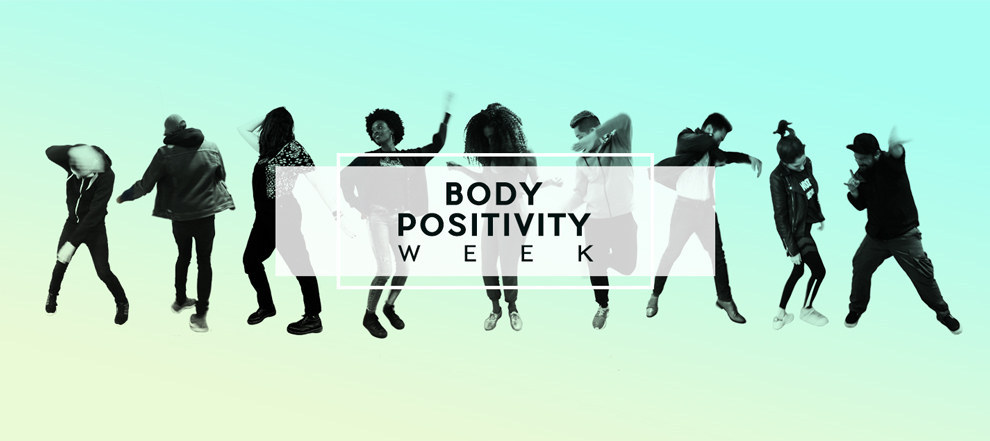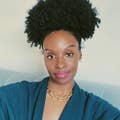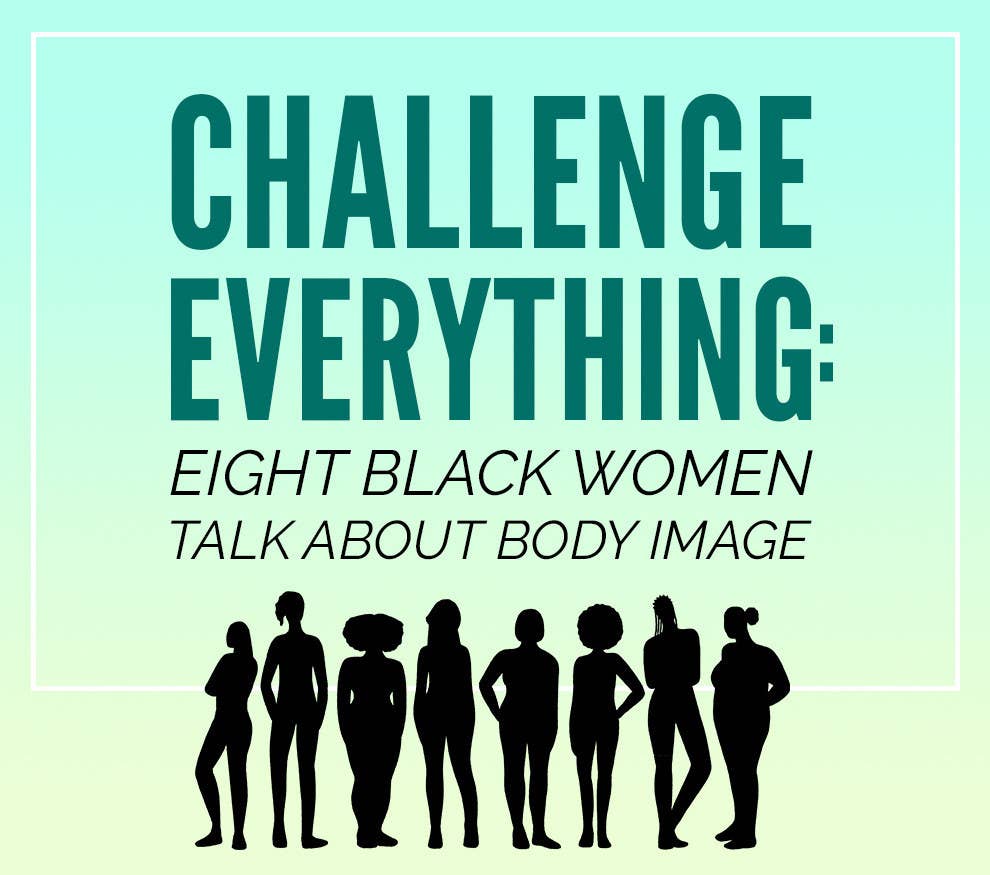
To be a black woman is to receive uniquely targeted messages about one’s body. The black female body is hypersexual or hypermasculine or both, but it is never our own. It is too obscene to be treated with respect but too alluring not to emulate. We are hip-hop vixens or mammies or (starving?) Africans. Black American women eat unhealthily, we are told, and so our happiness makes no sense. Our bodies do not deserve to celebrate, to move, to occupy space.
Exact statistics on the prevalence of eating disorders and disordered eating among women of color are often unavailable, but the National Eating Disorders Association notes that reports are on the rise. Most media discussion of disordered eating revolves around a single narrative: the experiences of primarily (upper) middle-class, heterosexual white girls and young women. When eating disorders — and body image struggles more generally — are dismissed as “white-girl problems,” black women have trouble finding both social recognition and helpful care.
What follows is an online conversation between eight black women about the messages we receive about our bodies, the ways they change, and how being black women complicates it all.
How are black women’s bodies talked about within (y)our own communities?
Driadonna Roland: I feel like the only body that is talked about favorably is a Nicki Minaj body — the exaggerated Coke-bottle, video-girl look that is literally not real life. So if men in my community discuss black women’s bodies, they only celebrate a specific ideal that is often unattainable. They don’t mean me. They don’t mean the majority of black women you see in your daily life.
Essence Gant: I’m from the South, so the conversations I’m used to hearing about our bodies are generally positive. Maybe it's because comfort and soul food tends to make us thicker, and that's something we're taught to celebrate; "fat” or “plus-size" in New York would be “thick” and “curvy” in the community I grew up in. I feel like black Southern beauty standards have given more women more leeway and opportunity to be included in the beauty conversation. We love Jill Scott’s curves just as much as we love Naomi Campbell’s long legs.
Bim Adewunmi: Depends on the community. In my Nigerian-British family space, we barely talk about black women’s bodies except as descriptors (“You remember your skinny cousin, Dupe?”) or when they are ~exceptional~ in some way. I am aware I sit very comfortably in the middle section — not thin, not fat — and that lends me a certain invisibility. I know I don’t have the idealised black woman’s body shape, but I’m cool. I am in the very nice spot of generally liking my body, and I think a lot of that is having a certain kind of Nigerian mother who never really spent time talking about bodies, except as the vessels we happen to live in.
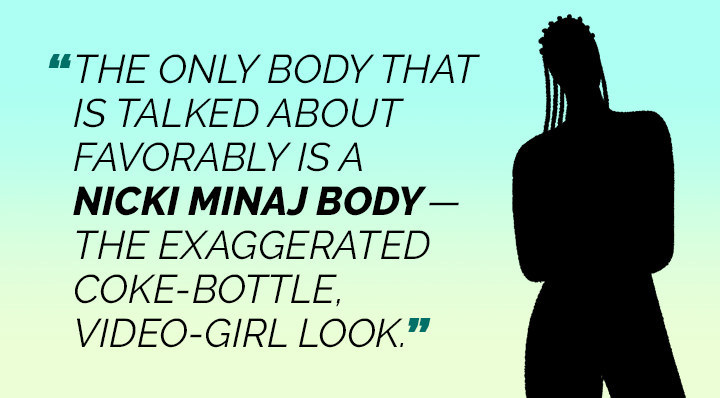
Anna Dushime: I also find that it depends on the community. Growing up in a small town in Germany, I was always made fun of because of my “African booty.” Kids used to call me “Fettarsch,” which is the equivalent of “fat ass” in English. When I told my mom, she would tell me that I have a Rwandan body and there is nothing to be ashamed of (thanks, Mama). In my family we still say “Rwandan legs” and mean a certain (thicker) shape that Rwandans appreciate, but is not sought after in Germany. So, my body type was made fun of in one community and praised in another, which was a weird experience. But I do find that there is a lot more chatter of dieting and working out in Rwanda now than there was before I moved to Germany in 1999.
Hannah Giorgis: That’s so interesting, Anna. Because Ethiopia in particular was and is associated with famine in the Western imagination, I grew up hearing things like “you look too well-fed to be Ethiopian” from Americans. That perception of the country has shifted a bit in recent years, but in my experience there is definitely a way Americans expect African bodies to look: slender, gaunt, malnourished — and I’ve never been that. But Ethiopian people, especially older women, often speak very candidly about bodies, too. I’ve always had aunts comment on my weight, when I’d gained some, or whether I looked more “grown” than the last time they’d seen me. Sometimes it’s the first thing they say when they see me.
Alanna Bennett: I grew up in Southeast Portland, Oregon, so black bodies were, to put it frankly, just not around that much. I was also raised by the white side of my family, so in the community around me, I was often the only one. When black bodies were discussed, it was often in the context of famous black people in movies or music, or violence against the black body that was making national news. My community as I’ve settled into adulthood has shifted to include far more people of color and therefore much more nuanced discussions of the black body.
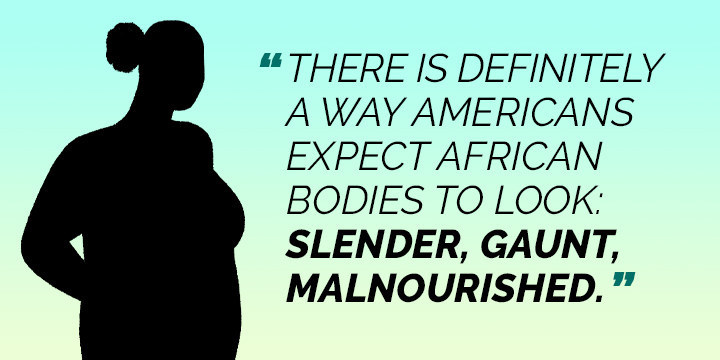
Sylvia Obell: As a first-generation American in a Kenyan family, I’ve heard quite a mix over the years. The Africans I know talk very openly about weight and do not hesitate to mention (loudly) when you’ve put some on and/or “need” to lose some. Although there are big and curvy women in my family, I’ve never seen that talked about in a celebratory way until living in New York City as an adult.
The only difference I found in the conversations with the black American community I grew up with was that it was treated in a softer way; many people were still obsessed with dieting and being a certain size, but not so mean about it. I feel the pocket of us celebrating curves and fatkinis is still very new and growing. I’m happy it’s here, but I think it will take many years to permeate our “let’s eat horribly unhealthy food, but I still expect you to have a small waist” society.
How do you and black women friends talk about your bodies with each other?
EG: To be honest, my friends and I rarely talk about bodies. When we do, though, it’s never focused on achieving a specific body type, but more so achieving our individual best bodies.
Chantal Follins: My close friends and I don’t talk about our bodies. We all have such diverse body types, and we are sensitive about protecting our space. We are trying to encourage each other to open up more. Consistently hearing from those who love you that your body is flawed can really get to you. So you move through life reserved and choose not to open up about your internal struggles, because you have been programmed to “fix” your body your whole life. This is a common trend I see in the black community, not just within my family or friend group.
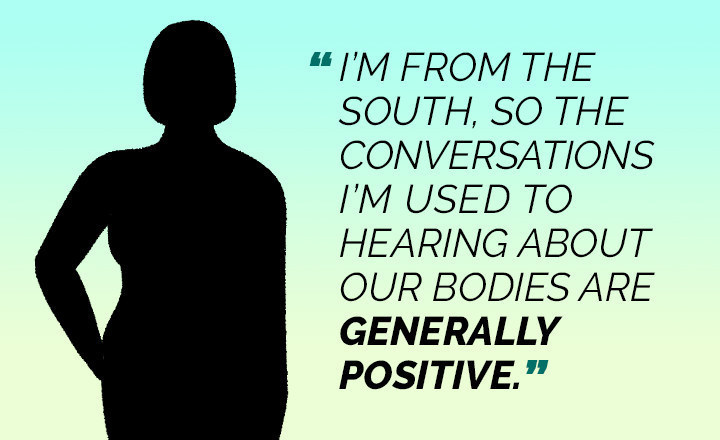
AB: When we do have conversations about black women’s bodies, it’s usually in the macro scope, of how the world reacts to them. There’s a general understanding that we all have very different bodies from each other and that our experiences are tailored to those specifics but still live under the same larger umbrella.
SO: My girlfriends are constantly working to chip away at each other’s body issues, and I feel so blessed to have them in my life. I’m always fascinated by the fact that we all fall on different points of the weight spectrum but still have insecurities. Someone will be like, “I hate my legs, I wish I had yours,” and another friend will say, “But I’d die for your booty!” and we’ll each sort of lift up whatever the other isn’t feeling about herself at that point in time. My girls lift up my body in a way literally no one else ever has. They make me feel proud about parts of me I used to hide. I don’t know where my confidence would be without them.
Do people respond differently to your body depending on where you are (e.g., in the city, the country, or even the world)?
DR: When I’m in the South, I find that people appreciate curves; they appreciate unique style; they like various complexions. My brown skin and big butt feel celebrated in the South. In the Midwest, I feel largely overlooked. There, it’s really about being cute in the face, having “nice hair,” and most importantly, having very trendy clothes. In Detroit, I always felt that girls who were light-skinned with long hair got all the attention.
And don’t even get me started on living in L.A. The city wrecked my self-image in a way that I am still intentionally trying to recover from. I did not just feel overlooked; I felt straight-up undesired. Their aesthetic is skin and bones, and racially ambiguous. Me, being brown-skinned and curvy with natural hair at the time, I felt like the opposite of what anyone wanted.
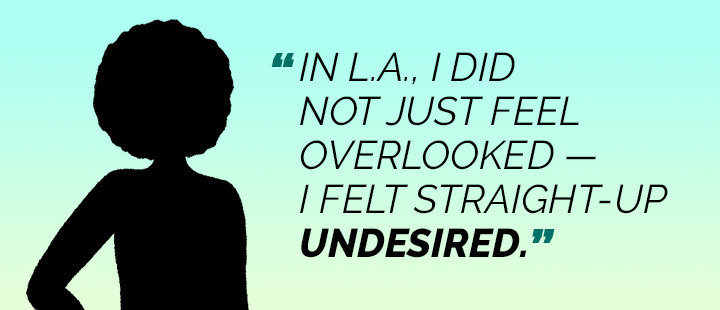
EG: HELLZ YES! This is very fascinating to me, too. Recently, Hannah and I were covering HBCU culture in Atlanta. We were conversing with two Morehouse alumni, who were VERY Southern, and I showed them an old photo of me during my reign as Miss Albany State. In response to the photo, one of them said, “See, you look healthy here” — as if I look sick now. I was still slim, but noticeably fuller in the photo than my current size (shout-out to that real Southern cookin’).
On the contrary, people are always admiring my body in New York, where I currently live. I hear, “You’re in such great shape” (which they say only because I’m skinny), and “If had your body…” at some point every week. I’ve never really been made to feel bad about my body, and I know for a fact this is because most people, regardless of where they are in the world, are conditioned to celebrate slender and tall figures. My body is often represented, and celebrated, in pop culture, so I am privileged in that way. My body type is mostly seen on white women, though. I usually only see black women with my body type in fashion — rarely in music or Hollywood.
CF: OMG YAAASS! Back home in Texas, I’m often not the desired body type. BUT THEN I WENT TO GHANA. Lawd, was I awakened. I was called a “trophy,” a “queen,” and I can't tell you how many marriage proposals I received. At first I was confused and very annoyed by it, because it was all new for me. But then I opened up and realized that beauty is actually different all over the world. I loved that experience, and you better believe I took in every moment. I’d literally walk down the street to get some fresh mangoes and pineapples and 15 men (I kid you not) would run to purchase my mangoes for me. Like whaaa? For me?! BLESS.
In New York, I have similar experiences to those I had in Ghana, depending on what borough I’m in (Bed-Stuy shows ya girl love; Harlem, oh yaaass). But no one is running to buy me mangoes yet... Just wait on it.
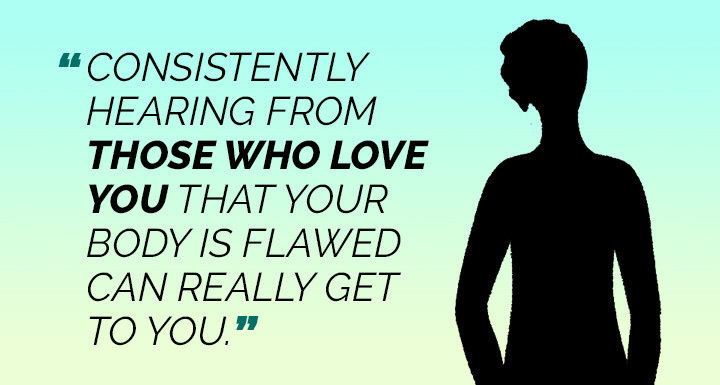
BA: London is the same as New York is the same as Lagos, as far as I can deduce. I remember being in Rome and getting a lot of comments (but that’s just a weirdly fetishistic — anecdotally common — thing that happens to many black women in Italy). Like I said, though, I am aware that my body fits in very closely with what is deemed unremarkable, aka “normal,” so it moves easier in the world, even with intersecting issues such as race and nationality.
HG: The way my body is regarded in parts of New York with noticeably black populations is so incredibly different from Southern California, where I grew up and where my family still lives. And that’s not just about my weight or shape; like Dria said, Los Angeles feels actively hostile toward natural hair and skin darker than a paper bag.
AD: YES! While visiting my cousins in Brussels, which has a large African community, I was more comfortable wearing tight clothes than I was in the small town where I grew up in Germany. The response in Brussels or in my hometown of Kigali is very different to the response I got in rural Germany.
When do you feel most comfortable in your own skin?
EG: When I’m NAKEEEEEEED, or in minimal clothing! I literally hate anything on my skin except for coconut oil and cocoa butter.
BA: When I’m dancing, or running. I love clothes, so if I’m wearing a beautiful dress, and it fits just so, you can’t tell me nothin’.
AD: I feel most comfortable at home or when I’m dancing or letting loose. A good outfit in which I feel bomb also doesn’t hurt.
HG: There’s no space when I feel more comfortable in my own body than when I am dancing, especially with friends. I feel most alive when I am dressed well, in a way that feels hyperfeminine and adorns my body with reminders of all the places that have shaped it.
SO: When I’m in a really great dress that hugs all my curves just right.
How has your relationship to your body changed over time?
DR: When I was younger, having internships in corporate environments, I felt like I had to be skinny. I was very aware of how much space I was taking up compared to others, and when I happened to lose weight during the school year, everyone treated me so much better when I returned to my internship. Now that I’m older and see women like Amber Rose and Blac Chyna being celebrated, I feel like I need to be thick. But I’m 5’1” — I will never be a “big fine” or a “stallion.” It’s difficult, but I am really hoping to get to headspace where I eat well and exercise and accept whatever size or shape my body wants to be when I take care of it.
EG: I just don’t care what other people think at this point. I’ve never obsessed much over my body anyway, probably because there’s so much body diversity among the women in my family. There were times when guys would say things like, “You’re pretty, but you’d be fine as hell if you were thick,” and it would sting in the moment. But it never lasted enough to give me a complex or make me feel a particular way. I love and appreciate my body more as I age. I like my slim silhouette and my lil' baby booty; it be pokin’ in my club dresses!
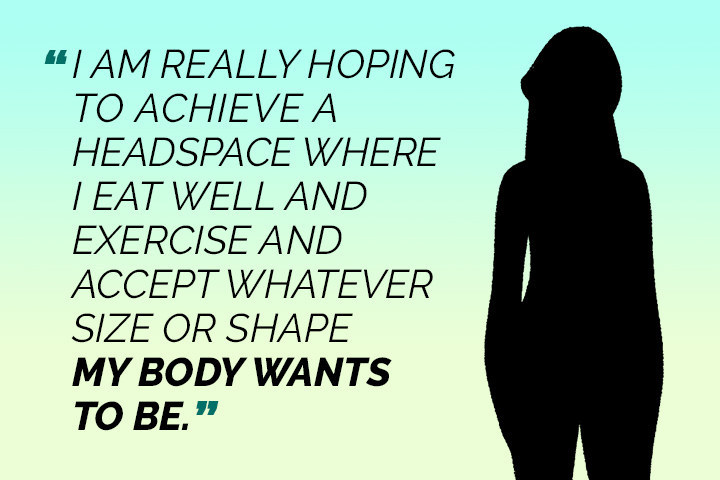
AB: I felt very unmoored in it for the longest time, but I feel like I’m finally getting the hang of what my body needs and wants. The parts of me that used to make me cringe in my adolescence just don’t anymore, for the most part. It’s all a process; I’m sure I’ll move in and out of certain insecurities forever. But I’ve stopped telling myself that I needed to lose weight or gain weight or always have my summer shade on to be worthy of being me.
BA: I went from not caring that much about my body to liking it, but the one thing that’s never changed is how much I love my legs — they have been consistently the most complimented part of my body all my life, and I have these dreams of being a Tina Turner type with them at 68. Oh, and my bum. I think it’s borderline magnificent.
AD: I used to fuss about having “mosquito bites” for breasts and a really large booty. I thought I had to be skinnier, so that the rest of my body would fit my bra size. It is interesting to me that now generally big booties have become something that is sought after — even in white/mainstream culture. People are doing squats and whatnot to get a fuller behind when they used to taunt me for mine. I definitely feel better about my body now than I did in my teens. I am trying to be healthier and fitter, but not necessarily to be skinnier.
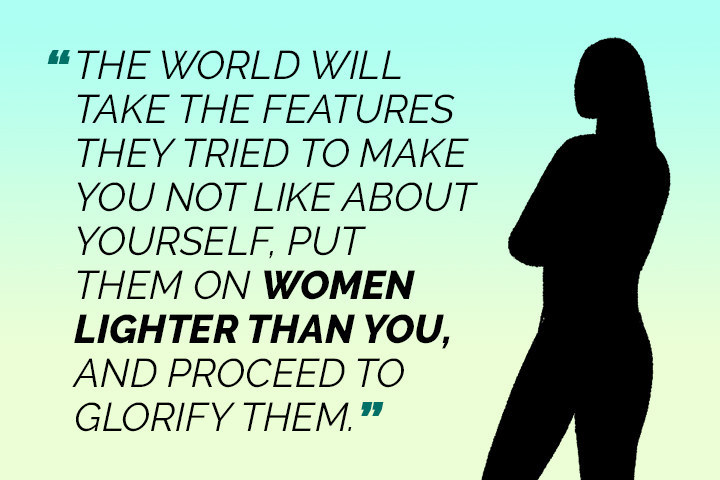
SO: My relationship with my body is probably the most complicated relationship I’ve had in my entire life. I’m a type-A personality, and usually find a way to achieve all my goals. The only part of my life I have yet to make that true with is my body. I got chubby during puberty and started my first diet in the sixth grade (Weight Watchers — Oprah, I love you, but it’s not so easy when you don’t have a private chef and farm in your backyard), and I’m on one now. I lose weight quickly, but I gain it fast too; throw in an emotional eating problem and you have the vicious cycle of me in an on-and-off relationship with the 50 pounds I keep gaining and losing.
I used to wear jeans in the summer, insisting that my legs just “didn’t get hot” as a preteen. Now as an adult, I’ll show my legs, but not my arms. When your body has gone through so many stages, it’s hard for your mind to catch up. Currently, thick being “in” helps. So does living in a city where I walk everywhere. I’m finally eating right more often than not. I love my boobs, I love my hips, I love that my ass is starting to grow higher vs. wider (squats!), and I’m working on loving everything else; because like me, each part deserves to be loved, flaws and all.
What would you tell your younger self about the way the world treats black women's bodies?
AB: I’d tell her not to trust it. I’d tell her there are very few sources that actually have your best interests at heart when it comes to your body, and that most everyone has some kind of twisted view on it, including your community and the people who love you. Challenge everything, and know in your heart that it’s OK to be built the way you feel most naturally yourself. Basically I’d tell her, “Do you, girl, it’ll be fine.”
EG: The world will try to make you feel bad about your body, throwing images in your face of bodies that don’t exactly look like yours. But know that your body is perfect and whole as is. When you realize this, you won’t ever look to media or anyone or anything for validation. And THAT is a bomb-ass feeling! Also, the world will do very little — if anything at all — to protect your actual physical body, so always be aware of your surroundings and stay on guard.
DR: I’d tell my younger self that it will wreck you if you view your body as though it is for consumption and must be appealing to observers. I’d tell her your body can serve you well at any size, but only to the degree you believe and project to the world. If you own, love, and project your powerful feminine energy, the world will respond the way you tell it to.
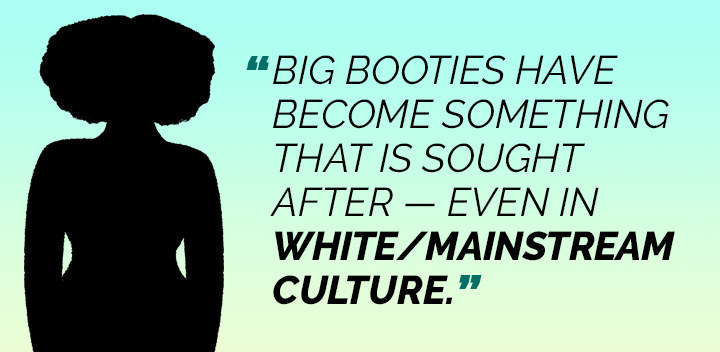
CF: I’d honestly tell my younger self to calm her tits. I was SO consumed by the media and what society thought MY body should look like and what I should or shouldn't wear. I’d tell her to listen to her mother and remember how she raised you. I’d tell her not to seek validation in the opinion of others, and to stand fast in her truth. It’s OK that you don’t look like everyone in your class, and that's what makes you so unique. Remember your worth and how truly special you are.
BA: “You in danger, girl.” Protect yourself. Because no one will take care of how you feel about yourself like you will. I’d tell myself that shit is skewed, and it’s fine to look outside of the places you’re told to look.
SO: The world will take the features they tried to make you not like about yourself, put them on women lighter than you, and proceed to glorify them like it’s something new and trendy. So don’t waste a second not loving your big lips, nose, hips, breasts, and whatever else they tried to make you insecure about before paying thousands of dollars to have. You have to love yourself first, baby girl. Everyone else will follow.
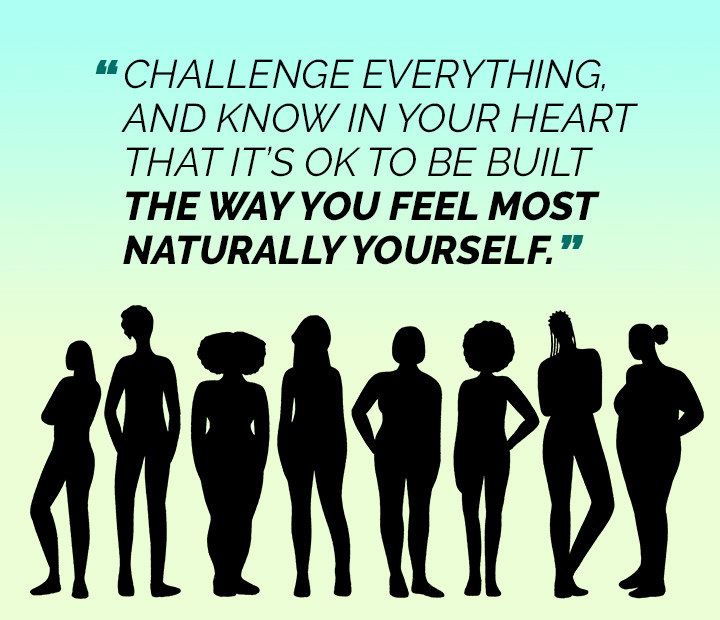
Body Positivity Week is a week of content devoted to exploring and celebrating our complicated relationships with our bodies. Check out more great Body Positivity Week content here.
